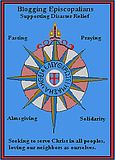on Lent, ambivalence, and self-denial
I grew up in a home that strictly observed Lent in an Anglo-Catholic way. Fasting on Ash Wednesday and Good Friday, until after services. No meat on Wednesday or Friday in Lent (exceptions made for my birthday, which always falls in Lent). Lots of extra church services as a family (my mother is a church organist, so there we were). I was always made to go to confession before Easter once I was old enough to be confirmed, and there was a checklist the priest handed out to us in confirmation class that we were supposed to use (the only thing I remember out of that was we weren't supposed to get our fortunes told.) Mostly I remember that the checklist didn't really seem to apply to me, that the stuff I felt unhappy about wasn't on there. Mostly I used to confess that I didn't clean up my room and I talked back to my parents.As I got older I started to understand sin in different ways--that not being authentic and true was a sin, being wrapped up in oneself, either feeling one was so much better than others, or so much less than others was also sin, not being honest about one's call was sin, not speaking up against injustice or squishing one's creativity--all these things were sin and not on the checklist anywhere.
But this Lent I'm feeling that for me, personally, a return to some of the more traditional Lenten disciplines will be helpful. I'm going to not say much now, as I'm still working it out, but I'm aware of a need for some structure. Having worked on a lot of big emotional clutter over the past ten years, I'm finding now about material things which have a deep hold on me.
The difference for me is what is imposed versus what is chosen. I'm really not sure how appropriate it is for children to fast, for a family to choose that for them. I'm grateful for the rhythms of the liturgical year that were a part of my life growing up, and are deeply woven into my faith life now, but I felt like I had so little choice and control in my life in so many ways, that was just another piece of it. Frankly, I also can have low blood sugar and I'm not crazy about parents making choices like these which affect their children's physical well-being. (Choosing not to have desserts as a family is another thing entirely. . .I'm talking about fasting from meals).
I'd love to hear about other's experiences of Lent and self-denial, in comments or on other blogs.

























9 Comments:
I grew up in the Methodist church and don't recall any of the restrictions my Catholic child hood friends had to abide by. I do recall however, being envious that those same friends did have something so concrete, ie no meat on Friday's, head covered when attending Mass etc. and that we didn't. And I learned how to genuflect because I thought it was soooo cool. I WANTED to go to confession. Weird, huh?
I grew up Catholic. I remember no meat on Fridays. So we had fish or spaghetti made with tuna in the sauce (not bad). Also we had to wear a scarf, lace mantillas or a hat to church.
I always feared that the priest would recognize my voice in confession. So I would report sins like, I said a cuss word... and whatever I could think of. The Guilt factor was not built in yet. ha Not like now any ways.
I still try to practice Lent as far as improving myself. I don't do the fasting. It is a very good time for self reflection.
I really don't like Lent - I would like to give up Lent for Lent. I don't know why I don't like it other than it's never been a liturgical season I have wanted to go through. This year, spring will have bloomed and by Easter, all the flowers that are in our explosion of spring will be gone. Are we supposed to like Lent? Inquiring minds want to know.
I just posted on Friday about Lent from the Benedictine perspective, and will probably put a little more up there before it's done, so feel free to visit & see what I've got .... your post gives me some food for thought for the addendum!
I may have developed an entirely new view of Lent these past few years. I'm sure that it is neither orthodox or traditional. I see that Jesus went to the wilderness to pray. He escaped from the crowds who hemmed him in. In this dwelling in the father, in this contemplative existence, in this solitude, he attained his greatest joy. It fed his spirit. Self denial has become not a thing of some sort of self-mortification or punishment, but a thing of foregoing the things of this world, of turning my eyes from created things to focus on the uncreated. There is a sadness, of course, as I contemplate his life and as I dwell in the Stations of the Cross--but it also gives me a better perspective on the sufferings that I think that I have endured which pale in comparison.
I don't want to blog about it right now.
I always give up celibacy for Lent but never seem to keep that promise.
I will certainly fast for Lent, in some way; I'm still thinking about trying the Orthodox fast, because last year's I found a bit too easy. And I will try to withdraw a bit, too, from the noise of the world. I may even try to arrange a personal confession this year; I like to try something I've never done before at this time of year, for some reason. I'll do something new, anyway.
I'll go as often as I can to Eucharist, too. That's one thing for sure.
Lent two years ago is when I had my own knock-down conversion experience, and I don't think the two things are unrelated. I find it a very mysterious and powerful time of year.
whats an Orthodox fast?
The Orthodox fast for Great Lent is abstention from all meat products, all dairy products, eggs, fish and olive oil - although you can have olive oil on the weekends, and on Feast Days, I think. Fish you can have on Annunciation and Palm Sunday.
It's vegan, basically, really, except for the restriction on olive oil.
Post a Comment
<< Home